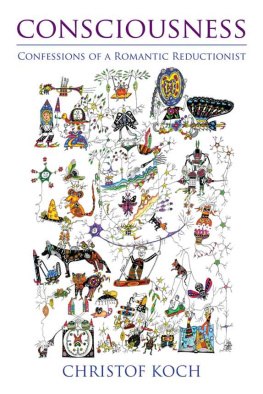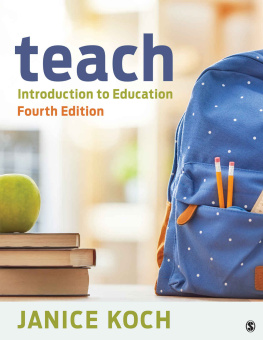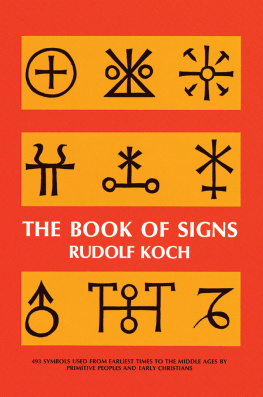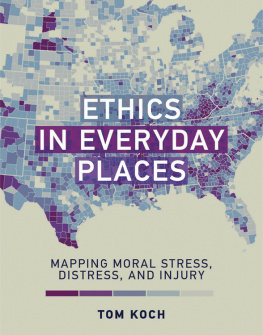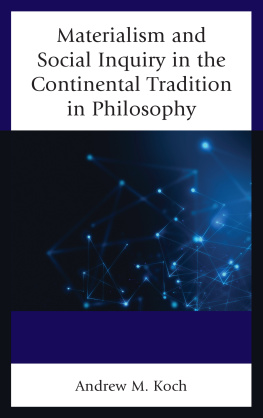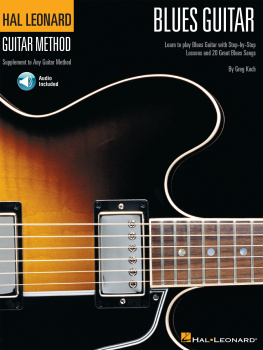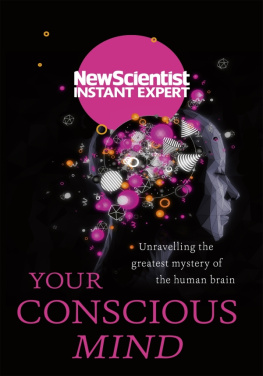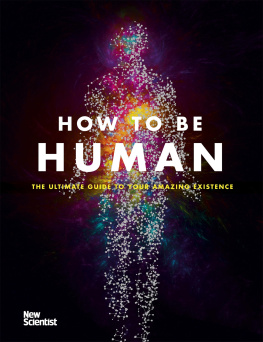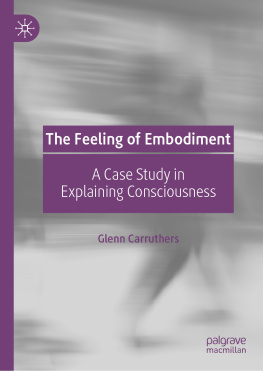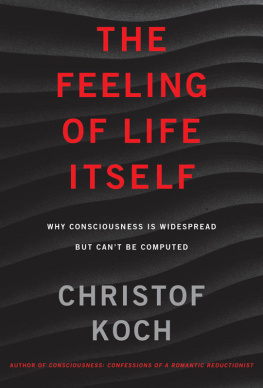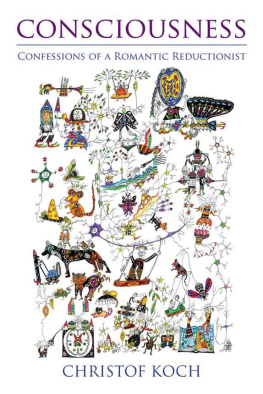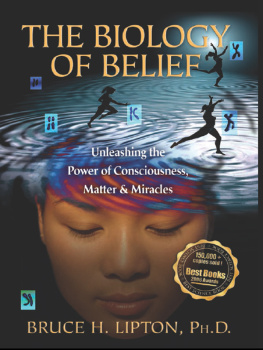Koch - Consciousness: confessions of a romantic reductionist
Here you can read online Koch - Consciousness: confessions of a romantic reductionist full text of the book (entire story) in english for free. Download pdf and epub, get meaning, cover and reviews about this ebook. City: London;Cambridge;Mass, year: 2012, publisher: MIT Press, genre: Religion. Description of the work, (preface) as well as reviews are available. Best literature library LitArk.com created for fans of good reading and offers a wide selection of genres:
Romance novel
Science fiction
Adventure
Detective
Science
History
Home and family
Prose
Art
Politics
Computer
Non-fiction
Religion
Business
Children
Humor
Choose a favorite category and find really read worthwhile books. Enjoy immersion in the world of imagination, feel the emotions of the characters or learn something new for yourself, make an fascinating discovery.
Consciousness: confessions of a romantic reductionist: summary, description and annotation
We offer to read an annotation, description, summary or preface (depends on what the author of the book "Consciousness: confessions of a romantic reductionist" wrote himself). If you haven't found the necessary information about the book — write in the comments, we will try to find it.
In which a scientist searches for an empirical explanation for phenomenal experience, spurred by his instinctual belief that life is meaningful.
Consciousness: confessions of a romantic reductionist — read online for free the complete book (whole text) full work
Below is the text of the book, divided by pages. System saving the place of the last page read, allows you to conveniently read the book "Consciousness: confessions of a romantic reductionist" online for free, without having to search again every time where you left off. Put a bookmark, and you can go to the page where you finished reading at any time.
Font size:
Interval:
Bookmark:
Consciousness
Consciousness
Confessions of a Romantic Reductionist
Christof Koch
The MIT Press
Cambridge, Massachusetts
London, England
2012 Massachusetts Institute of Technology
All rights reserved. No part of this book may be reproduced in any form by any electronic or mechanical means (including photocopying, recording, or information storage and retrieval) without permission in writing from the publisher.
For information about special quantity discounts, please email .
Library of Congress Cataloging-in-Publication Data
Koch, Christof, 1956
Consciousness : confessions of a romantic reductionist / Christof Koch.
p. cm.
Includes bibliographical references and index.
ISBN 978-0-262-01749-7 (hardcover : alk. paper)
ISBN 978-0-262-30103-9 (retail e-book)
1. Consciousness. 2. Mind and body. 3. Free will and determinism. 4. Life. I. Title.
B808.9.K63 2012
153dc23
2011040572
10 9 8 7 6 5 4 3 2 1
To Hannele
Preface
What youre holding in your hand is a slim exposition on the modern science of consciousness. Within the space of a few hours, you can inform yourself about where we natural scientists stand with respect to unraveling one of the central questions of our existencenamely, how do subjective feelings, how does consciousness, enter into the world? Through your head is the obvious answer. But that answer is not very helpful. What is it about the brain inside your head that makes you conscious of colors, of pain and pleasure, of the past and of the future, of yourself and of others? And does any brain suffice? What about the brain of a comatose patient, of a fetus, of a dog, a mouse, or a fly? What about the brains of computers? Can they ever be conscious? Ill tackle these questions and then some, including free will, a theory of consciousness, and the bte noire of my research: the extent to which quantum mechanics is relevant to understanding consciousness.
This book is not just about science, however. It is also a confession and a memoir. I am not only a dispassionate physicist and biologist but also a human being who enjoys but a few years to make sense of the riddle of existence. I learned over the past years how powerfully my unconscious inclinations, my beliefs, and my personal strengths and failings have influenced my life and the pursuit of my lifes work. I experienced what the novelist Haruki Murakami described in a striking interview: We have rooms in ourselves. Most of them we have not visited yet. Forgotten rooms. From time to time we can find the passage. We find strange things... old phonographs, pictures, books... they belong to us, but it is the first time we have found them. Youll learn about some of these lost chambers as they become relevant to the quest Im onto uncover the roots of consciousness.
Pasadena, California
May 2011
Acknowledgments
Writing, editing, and publishing a book requires the active cooperation of many people. Books are a testament to the better nature of humankindtaking pleasure in working toward a distant goal, with the primary reward being the feeling of a job well done.
Blair Potter took my prose and edited it. She identified the three distinct strands in my writing, un- and then re-braided them. If the outcome reads like anything close to a monolithic text, it is thanks to her. John Murdzek and Katherine Almeida proofread everything with a fine-tooth comb and Sara Ball, Amy Chung-Yu Chou, and Kelly Overly provided some more editorial advice.
Volney Gay, professor of psychiatry and of religious studies at Vanderbilt University in Nashville, invited me to give three Templeton Research Lectures on The Problem of Consciousness in Philosophy, Religion, and Science in spring 2007. It is here that inception for this book took place. I thank the John Templeton Foundation for their generous financial support for these public lectures.
I would like to acknowledge the many students, friends, and colleagues who read installments of the book and identified its many infelicities and inconsistenciesRalph Adolphs, Ned Block, Bruce Bridgeman, McKell Ronald Carter, Moran Cerf, David Chalmers, Michael Hawrylycz, Constanze Hipp, Fatma Imamoglu, Michael Koch, Gabriel Kreiman, Uri Maoz, Leonard Mlodinow, Joel Padowitz, Anil Seth, Adam Shai, Giulio Tononi, and Gideon Yaffe. Heather Berlin suggested the title. Bruce Bridgeman, McKell Carter, and Giulio Tononi took the time carefully to go through the entire text and emend it. Thanks to their collective efforts, their veiled or direct critiques, the book reads more smoothly, with fewer knobs that protrude, annoy, or distract.
Thanks to the many institutions that provided me a quiet haven. Foremost the California Institute of Technology, my intellectual home for a quarter of a century. During these past years, the hardest of my life, Caltech and its people were my one stable rock. They helped me to cope in ways both small and large. Korea University in Seoul provided a refuge in the Far East, with scope to write, think, and reflect upon all the matters discussed in these pages. The Allen Institute for Brain Science in Seattle generously gave me the time to finish this book.
Research in my laboratory is supported by the National Science Foundation, the National Institutes of Health, the Office of Naval Research, the Defense Advanced Research Projects Agency, the G. Harold & Leila Y. Mathers Foundation, the Swartz Foundation, the Paul G. Allen Family Foundation, and the World Class University program of the National Research Foundation of Korea. I am grateful to all.
Chapter 1:
In which I introduce the ancient mindbody problem, explain why I am on a quest to use reason and empirical inquiry to solve it, acquaint you with Francis Crick, explain how he relates to this quest, make a confession, and end on a sad note
I cant tell you what it really is, I can only tell you what it feels like.
Eminem, Love the Way You Lie (2010)
It was an everyday occurrence that set my life on a new path. I had already taken an aspirin, but the toothache persisted. Lying in bed, I couldnt sleep because of the pounding in my lower molar.
Trying to distract myself from this painful sensation, I wondered how it came to hurt so much. I knew that an inflammation of the tooth pulp sends electrical activity up one of the branches of the trigeminal nerve, which ends in the brain stem. After passing through further relays, nerve cells in part of the neocortical gray matter just beneath the skull become active and discharge their electrical impulses. Such bioelectrical activity in this part of the brain goes hand in hand with the consciousness of pain, including its awful, aching feeling.
But wait. Something profoundly inexplicable just happened. How can activity in the brain trigger feelings? Its just squishy stuff. How can mere meat, as cyberpunk novels dismissively refer to the body, engender sentience? Putting it more generally, how can anything physical give rise to something nonphysical, to subjective states? Whether it is the pain that I experienced on a distant summer day on the Atlantic shore, the joy I feel upon seeing my children, or the taste of a sparkling Vouvray, all have the same problematic origin in agitations of nervous matter.
It is problematic because of the seemingly unbridgeable gap between the nervous system and its interior view, the sensations that it generates. On the one hand is the brain, the most complex object in the known universe, a material thing subject to the laws of physics. On the other hand is the world of awareness, of the sights and sounds of life, of fear and anger, of lust, love, and ennui.
These two worlds are closely relatedas a stroke or a strong blow to the head demonstrates dramatically. Oscar Wilde expressed it poetically, It is in the brain that the poppy is red, that the apple is odorous, that the skylark sings. But exactly how does this transformation happen? How does the brain construct conscious experience? Through its shape, its size, its activity, its complexity?
Next pageFont size:
Interval:
Bookmark:
Similar books «Consciousness: confessions of a romantic reductionist»
Look at similar books to Consciousness: confessions of a romantic reductionist. We have selected literature similar in name and meaning in the hope of providing readers with more options to find new, interesting, not yet read works.
Discussion, reviews of the book Consciousness: confessions of a romantic reductionist and just readers' own opinions. Leave your comments, write what you think about the work, its meaning or the main characters. Specify what exactly you liked and what you didn't like, and why you think so.

